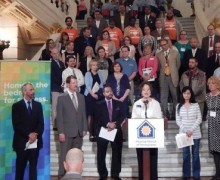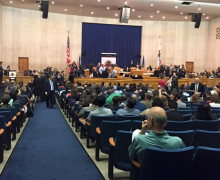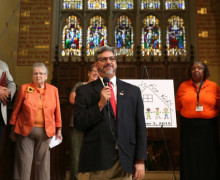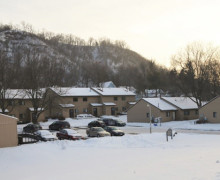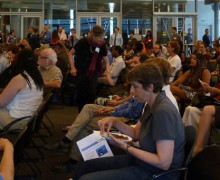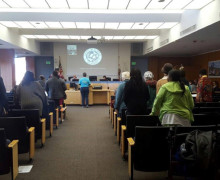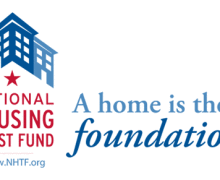Seattle Adopts Commercial Linkage Fee to Fund Affordable Homes
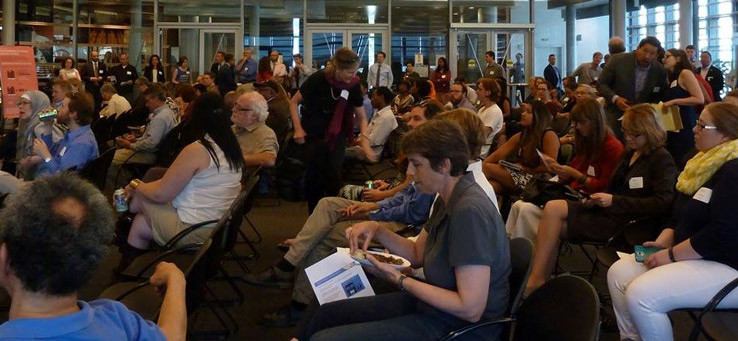
In November 2015, advocates for affordable homes celebrated a major milestone when the Seattle City Council unanimously approved a Commercial Linkage Fee (now called the Mandatory Housing Affordability-Commercial (MHA) program) tied to all new commercial development as well as a mandatory inclusionary zoning program. Adoption of the program represents the first legislative step from the recommendations of the Housing Affordability and Livability Advisory (HALA) Committee which was appointed by Mayor Ed Murray in September of 2014. Over the next decade the fees are projected to bring in well over $195 million to the city’s housing trust fund for affordable housing.
The negotiations that HALA had led from the original direction of a residential linkage fee to a mandatory inclusionary program coupled with a commercial linkage fee. In pushing for the commercial linkage fee, a decision was made to link it to upzones. (“Upzone” is when building sites are rezoned to allow the property to be built higher than originally zoned.) In order to take advantage of the strong markets in Downtown and South Lake Union, the commercial linkage fee became tied to upzones as they are approved. However, to note, revenue won’t be collected until upzones start being approved.
Through the Housing Development Consortium Seattle-King County (HDC) and Puget Sound Sage’s leadership of the Growing Together Coalition, dozens of community organizations and businesses created the political will for the commercial linkage fee and inclusionary housing. Individual advocates turned out at every key Council meeting during the campaign.
Marty Kooistra, Executive Director of the Housing Development Consortium (HDC) said, “HDC was in a perfect position to help the community move past the entrenchment that had for so long prevented us from achieving our shared housing goals. We partnered with Puget Sound Sage, a local nonprofit focused on social justice issues, to build a coalition called “Growing Together.” The 60-plus coalition members—from labor, environment, faith, race and equity, and affordable housing—kept a shared focus on overcoming the displacement and staggering housing costs that were eroding vitality and equity in a city that takes pride in its progressiveness.”
The collective pressure of Growing Together’s members was substantial. It gave the Coalition the influence needed to sit at the table with a group of 28 community leaders invited by the Mayor to create Seattle’s new Housing Affordability and Livability Agenda (HALA). After 10 months, this group produced 65 recommendations. The outcome of full implementation will be the creation of a net 20,000 homes for low-income households in the next decade.
The HALA Committee was charged to develop a long term plan that addresses the city’s housing crisis. Seattle already had an incentive zoning program on commercial buildings downtown since 2001 and for residential multi-family buildings since 2006. Over time, the program had been expanded to new neighborhoods as the Council passed new upzones. Incentive zoning is a set of requirements that property owners in certain zones must meet in order to achieve the full potential of their building site. Property owners are required to provide public benefits, such as affordable housing, historic preservation, and open space, in exchange for larger buildings. To meet the affordable housing requirements, a developer can either produce affordable units in the building they are developing or they can pay into the City’s affordable housing trust fund with an in-lieu fee.
However, Seattle’s incentive zoning program was found to be limited in its ability to provide significantly more affordable housing funding because first, it was geographically limited in scope to only identified zones and second, it was a voluntary program even in the areas it applies to. The linkage fee however, expands the geographic scope of the program and extends its application to all commercial and multi-family residential projects.
In September 2015, a year after the HALA Committee began meeting, Mayor Ed Murray and Councilmember Mike O’Brien announced the legislation for a commercial linkage fee and mandatory inclusionary housing program. For the first time, all new development wil be required to contribute to affordable housing.
Council Bill 118498 codifies a new chapter in the land use code, that being Chapter 23.58B under the title of “Affordable Housing Impact Mitigation Program for Commercial Development.” The code gives developers three options in providing affordable housing: an onsite and offsite performance option, fee in lieu option, or combination of the two. The amount of affordable housing required is first determined by zone and then square footage of proposed commercial space.
Basic details of the linkage fee structure are:
- The fee option ranges from $8 to $17.50 per square foot for commercial zones located in Seattle’s Downtown and South Lake Union neighborhoods. Elsewhere in the city, fees range from $5 to $10 per square foot.
- The performance option works slightly different as a ratio of rentable affordable housing to chargeable commercial space. In Downtown and South Lake Union, the percentage of rentable affordable housing floor area required ranges from 5% to 10.6% of chargeable commercial floor area. Elsewhere in the city, the ratio must be at least 5%. Additional strings come attached, including requirements that units that are provided as rentals, be sized comparably to market-rate units, and have a rental cap at 60% of the area median income for 50 years. Click here for more in depth information on how the Commercial Linkage Fee will work.
The above numbers are based upon a comprehensive study by David Paul Rosen & Associates that evaluated the economic impacts that commercial activity and jobs place on the local housing market. Their report recommended considerably higher impact fees per square foot than was eventually approved. Still, the fees are projected to provide well over $195 million over the next decade for affordable housing.
While the commercial linkage fee or now the Mandatory Housing Affordability-Commercial (MHA) program structure was enacted, no fees will be collected until upzones are approved. Over the next two years, HDC will be working with the City and a new, broader coalition which includes for-profit developers and employers to enact upzones that will require participation in the MHA program from starting on the ground floor.
For more information on Seattle’s program, contact Marty Kooistra or Kelly Rider at HDC 206.682.9541 or check out their web site at http://www.housingconsortium.org.



